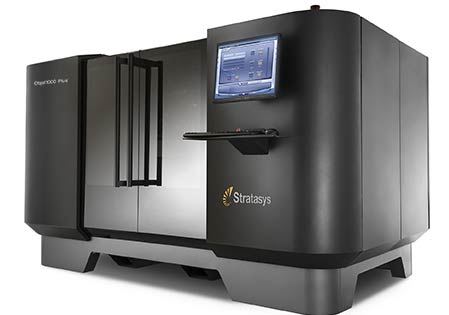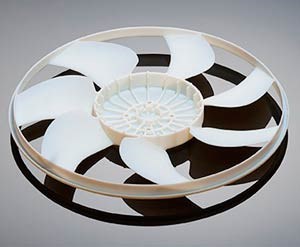Stratasys Introduces Its Industrial Scale Objet1000 Plus 3D Production System
Provides print speeds up to 40% faster than its predecessor, with a reported lower cost per part.
Stratasys Ltd. (Edina, MN, US) has launched its industrial scale Objet1000 Plus 3D production system, which is targeting applications for aerospace, automotive, medical devices and consumer products as well as for service bureaus and universities.
The Objet1000 Plus can mix materials and part sizes while maintaining ultra fine precision. Its extra large build envelope 1000 x 800 x 500 mm (or 39 x 31 x 19 inch) is efficiently traversed with a new optimized print block movement that accelerates print speeds up to 40% faster than its predecessor. This productivity boost alongside other refinements and simple post processing, which reportedly results in reduced cost-per-part.
Users can choose from more than 100 Stratasys materials including the polypropylene-like Endur. The Objet1000 Plus can produce tough parts with smooth surface finishes in high-speed mode while taking advantage of the new Endur Digital Materials that combine two resins in a single material for a wider range of material properties.
"From rubber-like materials to Digital ABS to various Shore A levels, up to 14 material properties are possible on a single part. And many parts can be produced with varying properties in a single run," said Ron Ellenbogen, product marketing director for Stratasys.
The workflow is identical to smaller PolyJet 3D printing systems, and the system is designed for long periods of unattended operation.
“Today’s designers and engineers at manufacturing companies and service bureaus need an additive manufacturing system that can take on all challenges – large and small. We believe that’s the big advantage of the Objet1000 Plus Production System. It is the first of its kind to combine large print sizes, multiple materials, accelerated print speeds, super fine resolution and a simplified workflow," Ellenbogen said.
Related Content
-
Additive Fusion Technology Optimizes Composite Structures for Demanding Applications
9T Labs continues to enhance the efficiency of its technology, which produces composite parts with intentionally oriented fibers.
-
Getting into Plastics Additive Manufacturing? Avoid these Six Common Errors
There are a lot of 3D printing technologies out there, and it’s not uncommon for processors new to additive manufacturing to get tripped up. Here are some typical snafus, along with advice on how to avoid them before you start making parts.
-
3D Printed Spine Implants Made From PEEK Now in Production
Medical device manufacturer Curiteva is producing two families of spinal implants using a proprietary process for 3D printing porous polyether ether ketone (PEEK).
















